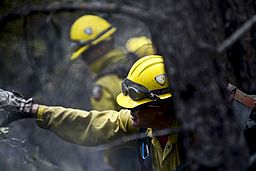 If you have an eating disorder, if you suffer from anorexia or bulimia, if you have a history of abuse, please be careful about exposing yourself to brutality. Be aware of the danger for you, in life certainly, and in videos, photos and films that depitc brutal actions.
If you have an eating disorder, if you suffer from anorexia or bulimia, if you have a history of abuse, please be careful about exposing yourself to brutality. Be aware of the danger for you, in life certainly, and in videos, photos and films that depitc brutal actions.
*pix This woman has the skill, courage and training to meet and subdue the fire. You can learn to cope with the fires in your life that were beyond your power in the past iff you give yourself the time, attention and practice, First you need to honor your present limits.
"Triggering" is too easy a description. In the psychology field it's called Retraumatization.
Exposing yourself to depictions of brutality can bring you to an emotional time in your life when you were vulnerable and powerless to care for yourself.
The fear and pain can be unbearable. Originally it may have been so unbearable that you needed to develop an eating disorder to block the pain or make yourself numb or oblivious.
When you learn to care for yourself you also learn to accept the realistic limits of what you canand cannot bear. As you develop you can tolerate more awareness of the hardships and violence in this dangerous world. But you need to honor and respect your limits in the here and now as you are today.
Also, when pressures of life are particularly stressful, your limits may be pressed even before exposure to violence or brutality in entertainment or in news. Recovery work involves learning to recognize and appreciate your tolerance levels so you can function in life.
If you learn to care and protect yourself you not only avoid the brutality experience. You also learn that you CAN care for yourself.
This helps you learn to recognize points of threat and danger in your life as well. You learn when to leave a conversation or the physical presence of someone when you feel a familiar feeling that indicates you are near or just past your limits.
You learn to honor and tend to your vulnerabilities. That leads to real healing.
"Recovery from trauma involves learning how to restore a sense of visceral safety, and reclaiming a loving relationship with one's self, one's entire organism." Bessel van der Kolk M.D.
*pix Vandenberg Air Force Base Hot Shot fire fighter Marissa Halbeisen helps cut and clear a fire line on June 28, 2012 in the Mount Saint Francois area of Colorado Springs, Co. while helping to battle several fires in Waldo Canyon. U.S. Air Force Photo by: Master Sgt. Jeremy Lock, As a work of the U.S. federal government, the image or file is in the public domain in the United States.
Links:
The Trauma Center is a program of Justice Resource Institute (JRI), a large nonprofit organization dedicated to social justice by offering hope and promise of fulfillment to children, adults, and families who are at risk of not receiving effective services essential to their safety, progress, and/or survival. The Executive Director of the Trauma Center is Joseph Spinazzola, Ph.D., and the Medical Director and Founder of the Trauma Center is Bessel van der Kolk, MD, who is an internationally recognized leader in the field of psychological trauma.
Interview with Bessel van der Kolk on Trauma, Development and Healing
Approaches to the Treatment of PTSD by Bessel A. van der Kolk, M.D., Onno van der Hart, Ph.D.,
Jennifer Burbridge, M.A.


Add comment